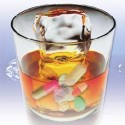Abilene universities discourage drinking
An Associated Press analysis of federal records found that 157 college-age people, 18 to 23, drank themselves to death from 1999 through 2005, the most recent year for which figures are available.
Over the seven-year span, 83 of the college-age victims were under the drinking age of 21.
A separate AP analysis of hundreds of news articles about alcohol-poisoning deaths in the past decade found that victims drank themselves well past the point of oblivion — with an average blood-alcohol level of 0.40 percent, or five times the legal limit for driving.
Schools and communities have responded in a variety of ways, including programs to teach incoming freshmen the dangers of extreme drinking; designating professors to help students avoid overdoing it; and passing laws to discourage binge drinking.
The federal data showed deaths spiking on weekends — when young people are more likely to go out with the goal of getting drunk — and in December, when college students wrap up finals. Most of the dead were young men.
Every year, Karen Douglas, a counselor at McMurry University, offers a voluntary alcohol screening for students at her school, part of a national effort each year to assess how much drinking college students do each year, whether they’ve been in an accident or injured, have relatives with alcohol problems, etc.
While binge drinking doesn’t appear to be a problem on her campus, Douglas said she does at times have to recommend to students that they curb their drinking — or if they are underage, stop altogether.
“Based on their score, we would sit down with them and give them advice, or recommend that they follow up with a professional,” she said.
Like Abilene’s other universities, alcohol is not allowed on McMurry’s campus, and the school takes an active interest in teaching students about the dangers of alcohol use and abuse in the form of special classes and other resources.
Vanessa Roberts, dean of students at McMurry, said a proactive approach, and open dialogue with students about the hazards of alcohol, can make a difference in preventing such accidents.
Roberts even encourages students to call her directly, no matter what time of the day or night, if they need help, she said.
“They all have security’s cell phone number, and they have my cell phone number,” said Roberts, who said she has gotten calls “at two or three o’clock in the morning” from students with questions or concerns.
The potential dangers of alcohol use are discussed in a McMurry 101 class required to be taken by every freshman. The course also deals in part with the hazards of other drugs, Roberts said.
The college emphasizes that any drinking under the age of 21 is illegal while also talking about making healthy and safe choices, she said.
“It’s not like we pretend it doesn’t happen,” she said.
Those who are under 21 who are caught with alcohol on campus must attend a state-sanctioned alcohol course taught by the university’s nurse.
“It’s two nights, three hours each night,” she said.
Rules and regulations
Lynne Bruton, Abilene Christian University’s director of public relations, said that the college has never experienced an alcohol-related death on its campus and does not have a problem with binge drinking “because ACU maintains an alcohol-free campus.”
But the school is “aware that binge drinking is becoming a large part of college culture across the nation,” Bruton said, and thus offers various alcohol education programs to the student body, including “Making Choices Week,” she said.
Also, as part of its residence hall curriculum, all on-campus residents attend mandatory meetings where many issues are discussed, including alcohol.
For off-campus students, ACU offers voluntary general safety seminars, where alcohol dangers and issues are addressed.
Hardin-Simmons University offers sessions led by faculty and staff about the dangers of alcohol during new student orientation.
“We also have small student-led discussions about the topic during the week,” said Forrest McMillan, the school’s dean of students. “Our nurse’s office offers a program once a year where students can experience simulations of driving drunk and impaired vision as well as a program communicating the dangers of abuse.”
Additionally, the school’s student development office offers four classes a year on alcohol and drug abuse prevention.
Learning lessons
Hardin-Simmons student Abigail Michel, 21, said that she wasn’t aware of binge drinking on the campus.
“I think if people do drink, they’re usually pretty responsible,” she said.
While she said she was certain some students drink on campus, it’s not something Rachael Tomko, 22, has ever done during her time at Hardin-Simmons University, where she is a graduate student.
“It’s just not a main theme here,” she said. “The theme here is the activities you can get involved in (and) the things you can go to.”
HSU student Allison Baskin, 20, agreed.
“Obviously it is a college campus, and there are kids just starting out on their own,” she said. “They’re getting away from their parents, and they’re probably going to try some things that aren’t that smart.”
Though McMurry offers manifold resources to students, Douglas’ yearly survey shows that “some people are obviously not learning” what the university and others are trying to teach them about alcohol, she said.
_____________
source: Abilene Reporter News

